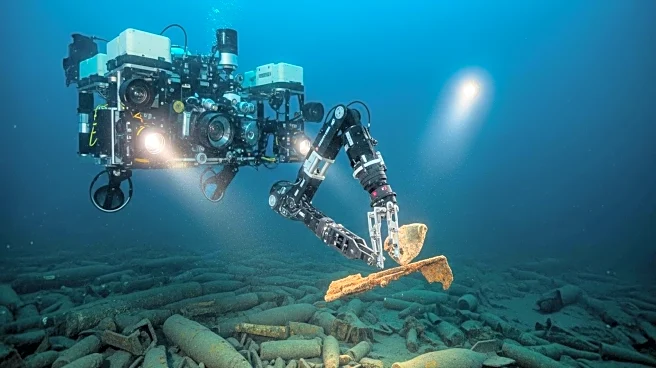What's Happening?
Germany has committed 100 million euros to recover approximately 1.6 million tons of World War II ammunition from the Baltic Sea. This initiative is part of a broader effort to address the environmental and explosive threats posed by the decaying ordnance. The ammunition, which was deliberately sunk post-war to prevent future hostilities, is now releasing toxic compounds into marine ecosystems. The German government has deployed divers and underwater robots to safely extract and dispose of the hazardous materials. This cleanup effort coincides with rising tensions between NATO and Russia in the Baltic region, where incidents involving sabotage of undersea cables and airspace violations have become more frequent.
Why It's Important?
The recovery of WWII ammunition from the Baltic Sea is crucial for both environmental and geopolitical reasons. The decaying ordnance poses a significant risk of contamination and potential explosions, threatening marine life and human safety. Additionally, the cleanup effort is timely given the escalating tensions between NATO and Russia, which have heightened security concerns in the region. By addressing these environmental hazards, Germany is not only protecting its marine ecosystems but also reinforcing its commitment to regional stability. The initiative may also serve as a model for other countries facing similar challenges with underwater munitions.
What's Next?
Germany's current project is a pilot initiative, with plans to develop long-term strategies for ammunition recovery and disposal. The government aims to find automated solutions to minimize human risk and improve efficiency. The success of this project could influence similar efforts in other countries, particularly those in the Baltic region. As NATO continues to monitor the area for security threats, the cleanup operation may also play a role in broader defense strategies. The international community will likely watch closely to see how Germany balances environmental concerns with geopolitical pressures.
Beyond the Headlines
The presence of WWII ammunition in the Baltic Sea highlights the long-term environmental impacts of historical conflicts. The cleanup effort underscores the need for sustainable solutions to address legacy pollution. It also raises questions about the responsibility of nations to manage the remnants of past wars. As Germany leads this initiative, it may prompt discussions on international cooperation and funding for similar projects worldwide. The situation also illustrates the complex interplay between environmental stewardship and national security in contemporary geopolitics.









